Suji Ka Halwa, also known as Sheera is a simple Indian semolina pudding, made with basic ingredients – semolina, sugar, and ghee. The pudding tastes simply divine, and takes just 20 minutes to prepare.
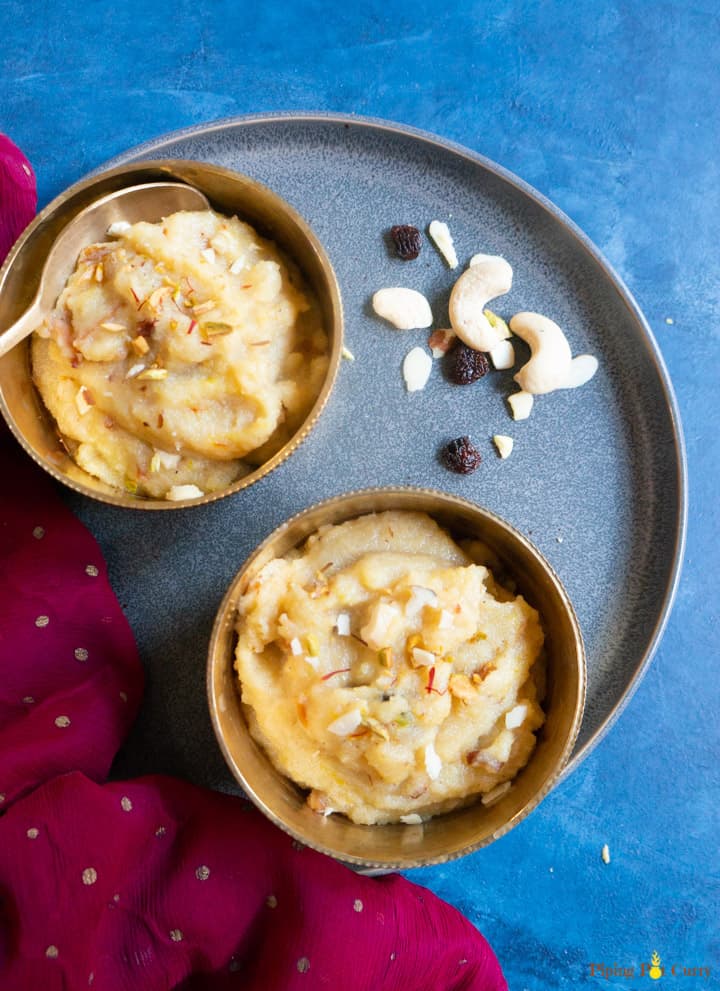
This delicious dessert is prepared all over India, and has many different names. In North India, it is Sooji or Suji ka Halwa or Rava Halwa (rava is another name for semolina). In Maharashtra, it is called Sheera or Rava Sheera. In South India, it is popular as Kesari with the addition of saffron or food color or called Kesari Bhath. In Karnataka, it is called Sajjige. In fact, this semolina pudding is popular in Europe as well.
The reason for the popularity of this Sooji Halwa is that it can be prepared with ingredients that are easily available and can be whipped up at short notice.
Sooji ka Halwa is many times an offering to gods for Ashtami or Navratri Pooja. It is also a the offering made during Satyanarayan Pooja. These festivals have a significant meaning in India, which makes this halwa so popular.
What is Halwa?
Halwa is typically made of flour (of various kinds), sugar, nuts, water and some fat (oil or ghee). Halwa has it’s roots in many cultures such as Turkish Halva, Indian Karachi Halwa and Spanish Turron.
This Sooji Halwa is made with semolina, sugar, ghee and water (and/or milk). Addition of cardamom powder, nuts and saffron is optional, but recommended as it enhances the flavor and nutrition.
Check out other popular Halwa recipes:
- Coconut Pumpkin Halwa
- Carrot Halwa
- Moong Dal Halwa
- Besan Halwa
- Aate ka Halwa
- Badam ka Halwa
- Lapsi Halwa
What is semolina?
Semolina is course flour made from durum wheat. It is usually golden or off-white in color. Semolina can have a more earthy aroma than common wheat flours. It is a high gluten and high protein flour.
It is commonly used to make pudding, porridge such as this thick Rava Upma and sometimes cakes such as this Orange Semolina Cake.
Note: Semolina is completely different than cornmeal, which is made from corn.
How to make Suji halwa?
Making Sooji Halwa is very easy, but the important thing to note is to follow the proportions. Once you have the proportions right, and a bit of patience to roast the sooji well, this Sooji Halwa is very easy to make.
Let’s start with the ingredients for the Sooji Halwa.
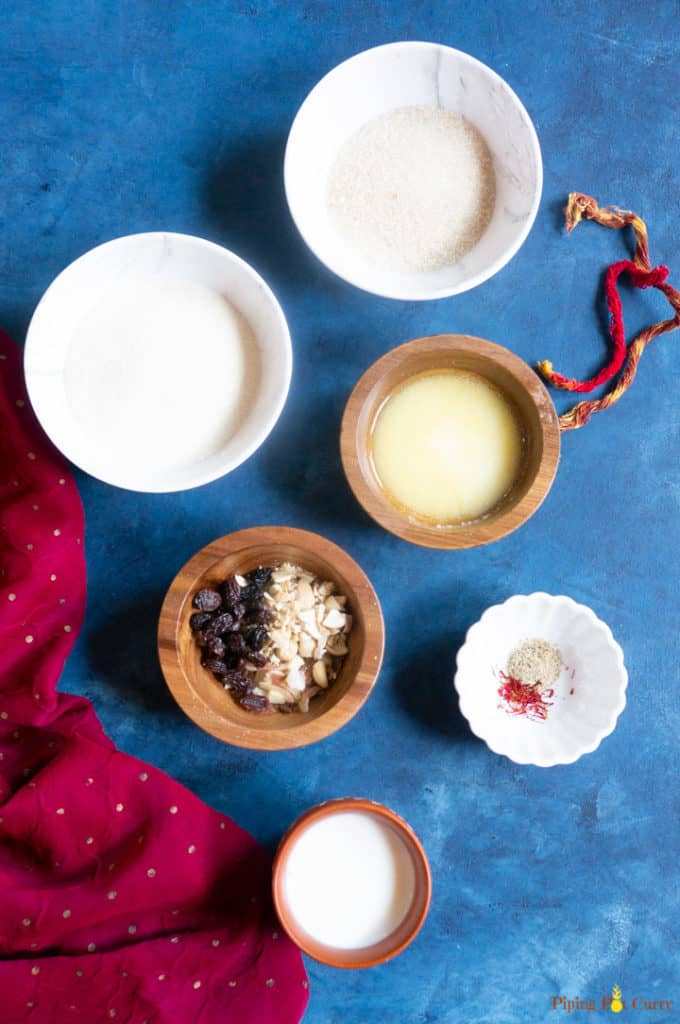
Starting from the top, we have sugar, sooji (semolina), ghee, nuts & raisins, cardamom & saffron and milk (+ water). Here is my recipe to make ghee from unsalted butter.
Here are some questions I used to get for the ingredients when making Sooji ka Halwa.
Which semolina to use for Sooji Halwa?
Usually in the store you will find “fine” and “coarse” varieties of semolina. For Halwa, we use fine sooji, and course sooji works well for Upma.
What to use: Milk or Water to make Suji Halwa?
The easy answer is that either works or a mixture of both milk and water works too. When using water, the color will be more on the brownish side. If you use milk, the final Sooji Halwa will look more whitish in color.
Milk also gives a much smoother texture to the halwa. I prefer to use a combination of milk and water. Hence in this recipe, I used a proportion of 1:3 milk to water – 1/2 cup milk with 1 1/2 cup of water.
Let’s continue with the steps to make Sooji ka Halwa.
In a small pot, boil the milk and water, along with the sugar, ground cardamom and saffron. Stir at regular intervals. Turn off flame, once there is a boil and sugar has mixed completely.
At the same time, Heat another pan on medium-low flame. Add sooji and ghee to the pan. Roast the sooji till lightly brown. You want to roast the sooji at a low temperature, while stirring continuously. Keep a close eye, as it can go from lightly brown to dark brown very quickly. Add nuts when it has turned golden, so the nuts will roast along with the semolina.
Spoiler Alert: Your house will smell divine with the smell of ghee while roasting this sooji.
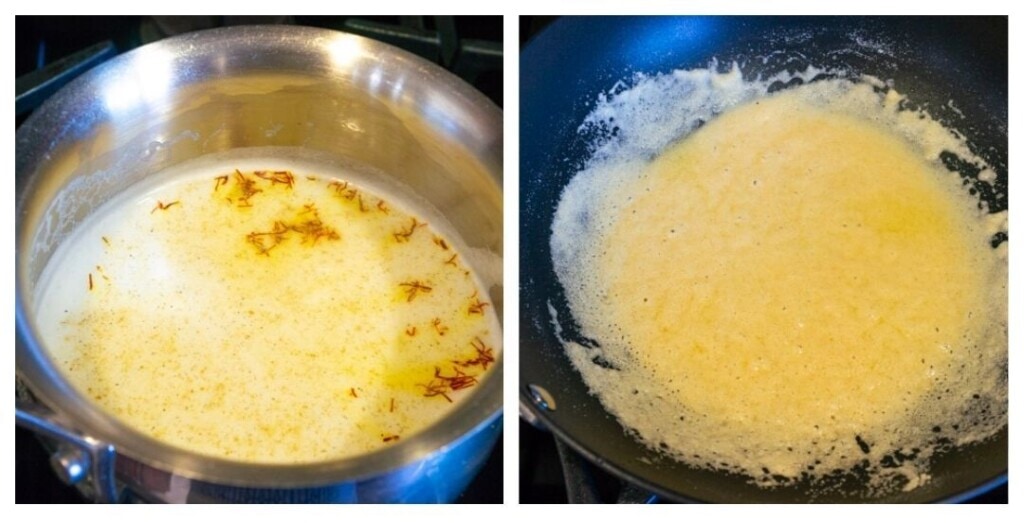
Once the semolina is roasted, carefully pour the boiled water+milk mixture into it. Be careful as initially there will be some splatters.
Now keep stirring while the mixture combines and is at a dropping consistency. This should just take 2-3 minutes. It should be a porridge like consistency where it can be easily served.
However as it cools, the sooji halwa will set completely. You can break it with a ladle and reheat in a microwave to consume. It will become fresh as just made once heated.
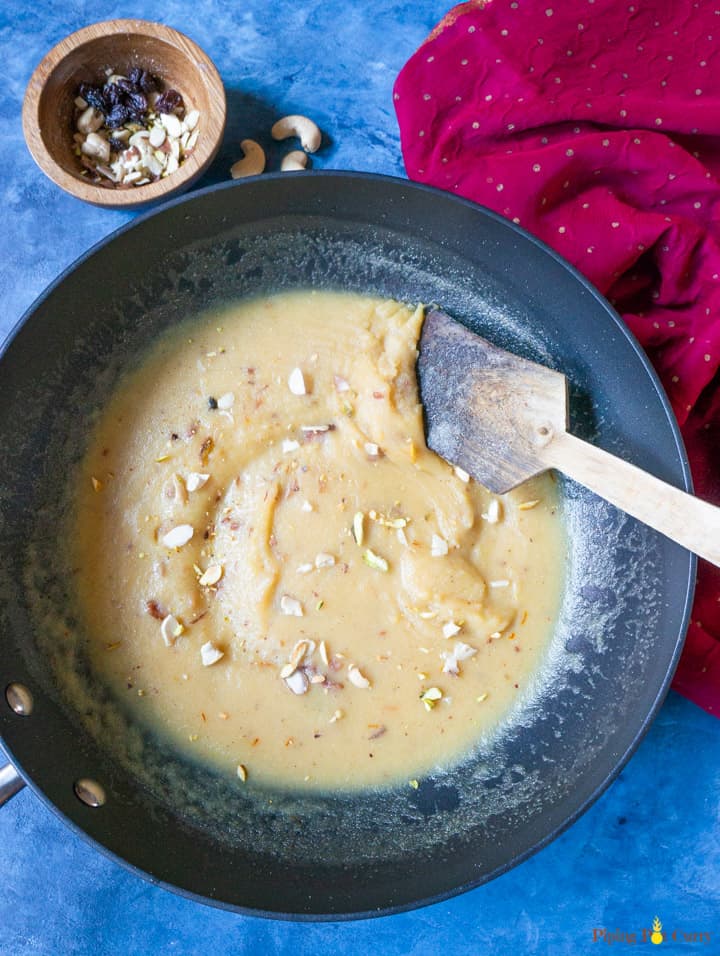
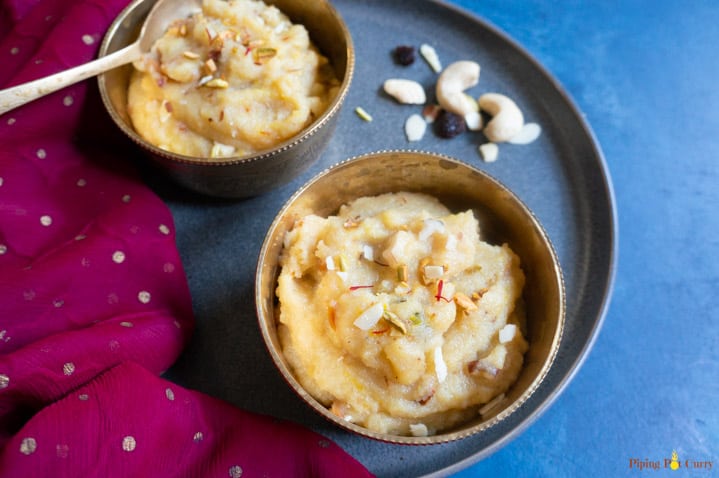
Tips to make perfect Sooji Halwa or Sheera
√ Don’t skimp on ghee when making halwa. I have tried with less and it does not taste as good.
√ Be patient when roasting the semolina, it takes time. But roasting along with ghee definitely helps to speed the process.
√ Boiling the liquids helps to make softer perfectly cooked halwa. So don’t skip that, and it also helps to do the steps in parallel.
√ Nuts, saffron and cardamom are optional. Add or skip based on your taste and availability.
I recently made this Suji Halwa at a friends place for dinner, and believe me, it was gone in minutes. It is so delicate and aromatic, which makes it so hard to resist.
Every year for Ashtami, we make Kala Chana with this Sooji Halwa and Poori. It takes me back to my childhood days, when I would get this Prasad for Kanjak or Kanya Pooja (young girls until 9 years of age are worshipped on this day). This is the best combination you will ever have!
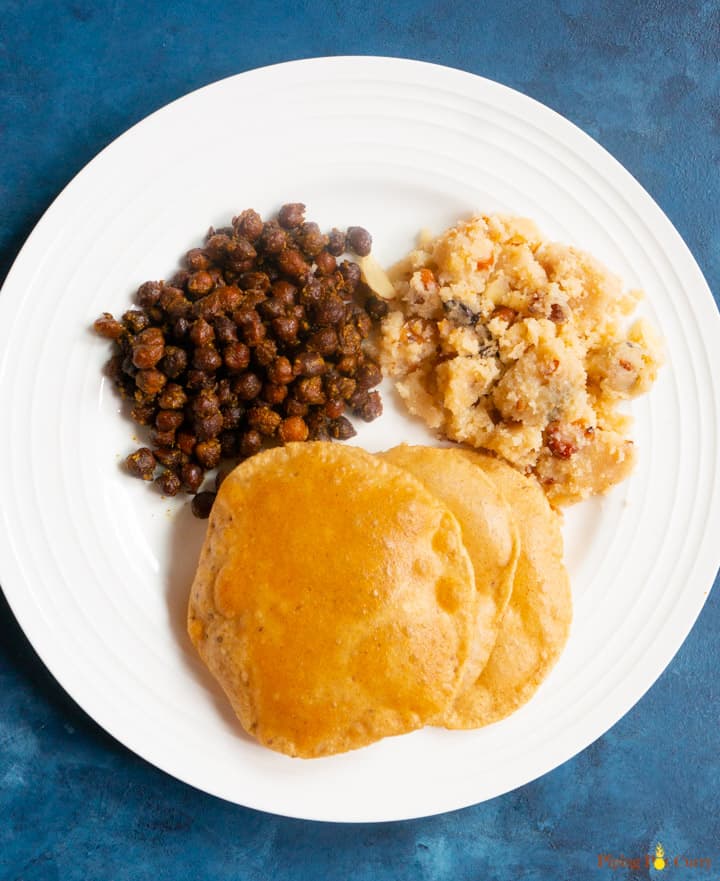
Give this Suji ka Halwa a try and don’t forget to let me know how it turned out.
Check out other recipes with semolina – Rava Dhokla, Rava Upma and Orange Semolina Cake.
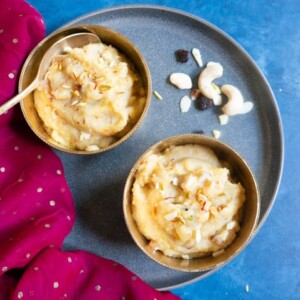
Sooji Halwa Recipe | Sheera | Indian Semolina Pudding
Ingredients
- 1/2 cup Semolina (Sooji/Rava), fine
- 1/4 cup Ghee
- 1/3 cup Sugar , can be increased to 1/2 cup depending on taste
- 1/2 cup Milk
- 1 1/2 cup Water, reduce to 1 cup water for a crumbly texture for sheera
- 1/4 teaspoon Cardamom powder (Elaichi)
- Saffron (Kesar), few strings
- 1/4 cup Mixed nuts , chopped, divided (cashews, almonds, pistachios, raisins)
Instructions
- In a pot, add the water, milk, sugar, cardamom and saffron. Heat on medium-high flame until it comes to a boil. Turn off once there is a boil.
- While the above step is going on, heat a pan on medium-low flame. Add sooji and ghee. Roast it while stirring continuously until it starts turning golden.
- Add half of the nuts to the pan and roast along with the semolina. Turn the flame to low as soon as the sooji lightly browns.
- Pour in milk, water and sugar mixture, while stirring. Be careful as there will be some splatter when you initially start pouring, but that will stop once once of the mixture is added.
- The halwa will boil and thicken. Keep stirring.
- Remove from flame when it just thickens. Let it cool. Garnish with remaining nuts. Serve immediately.
Notes
Nutrition
Subscribe to my Youtube Channel for tasty video recipes. Looking for Instant Pot recipes, check out my Instant Pot Recipes board on Pinterest.
Check out the collection of 10 Instant Pot Indian Desserts from the best blogs.
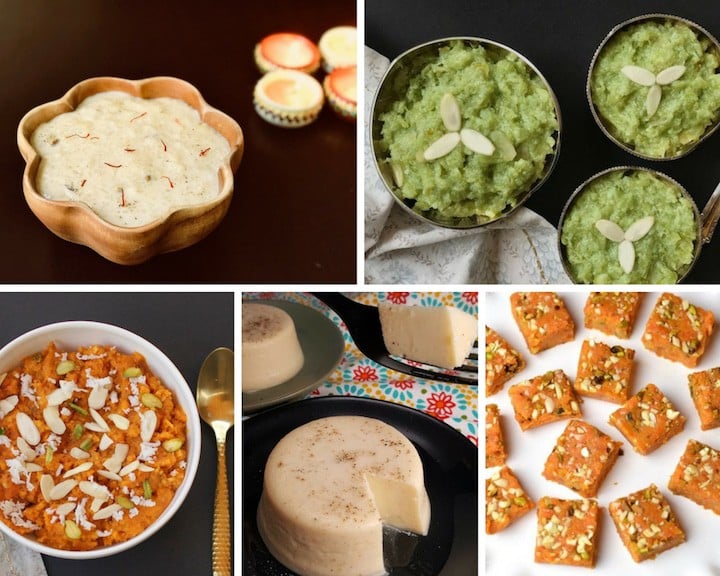
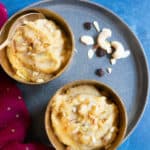
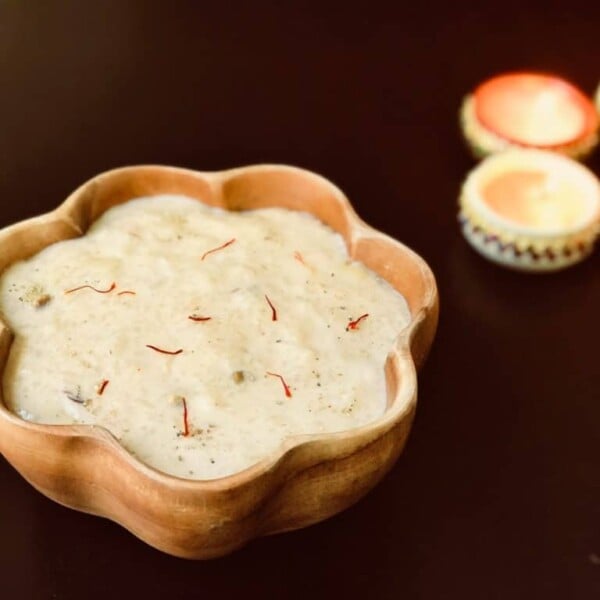
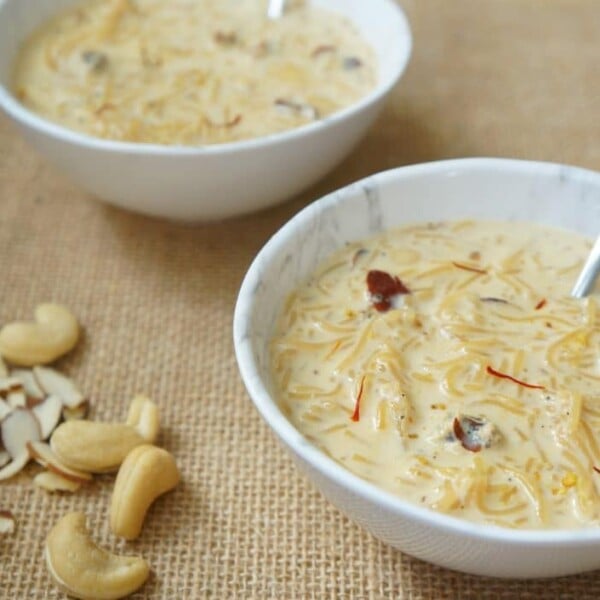
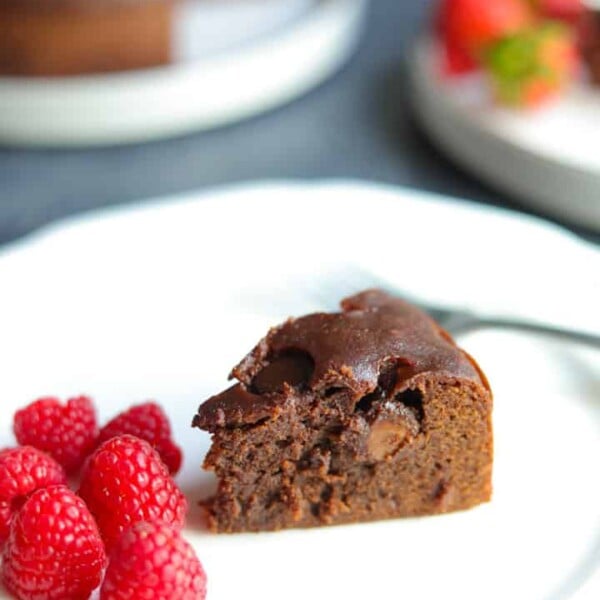
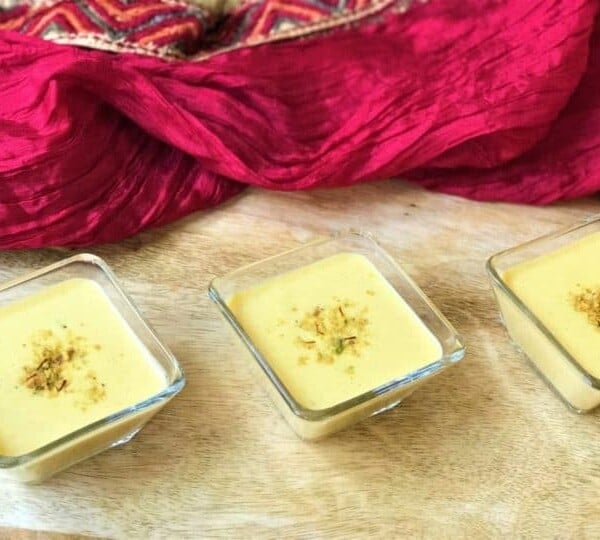








Can I use store bought roasted rava?
Hi Shruthi – I have not tried, as the store bought roasted rava is usually the thicker rava (mostly used for upma). That said, it will work, but the halwa will be more grainy. Would love to hear if you give it a try.